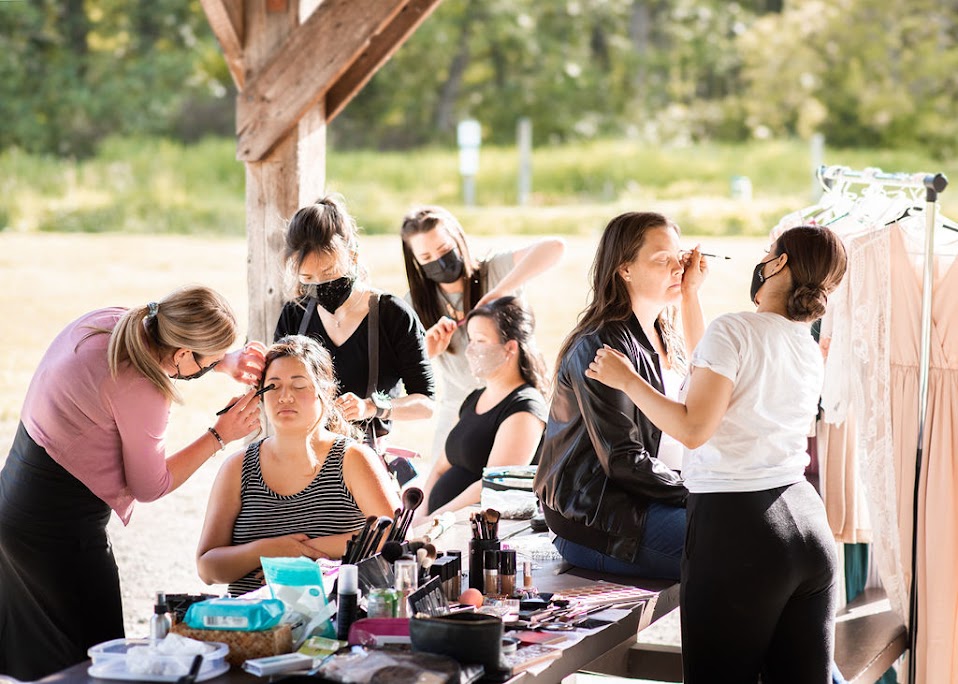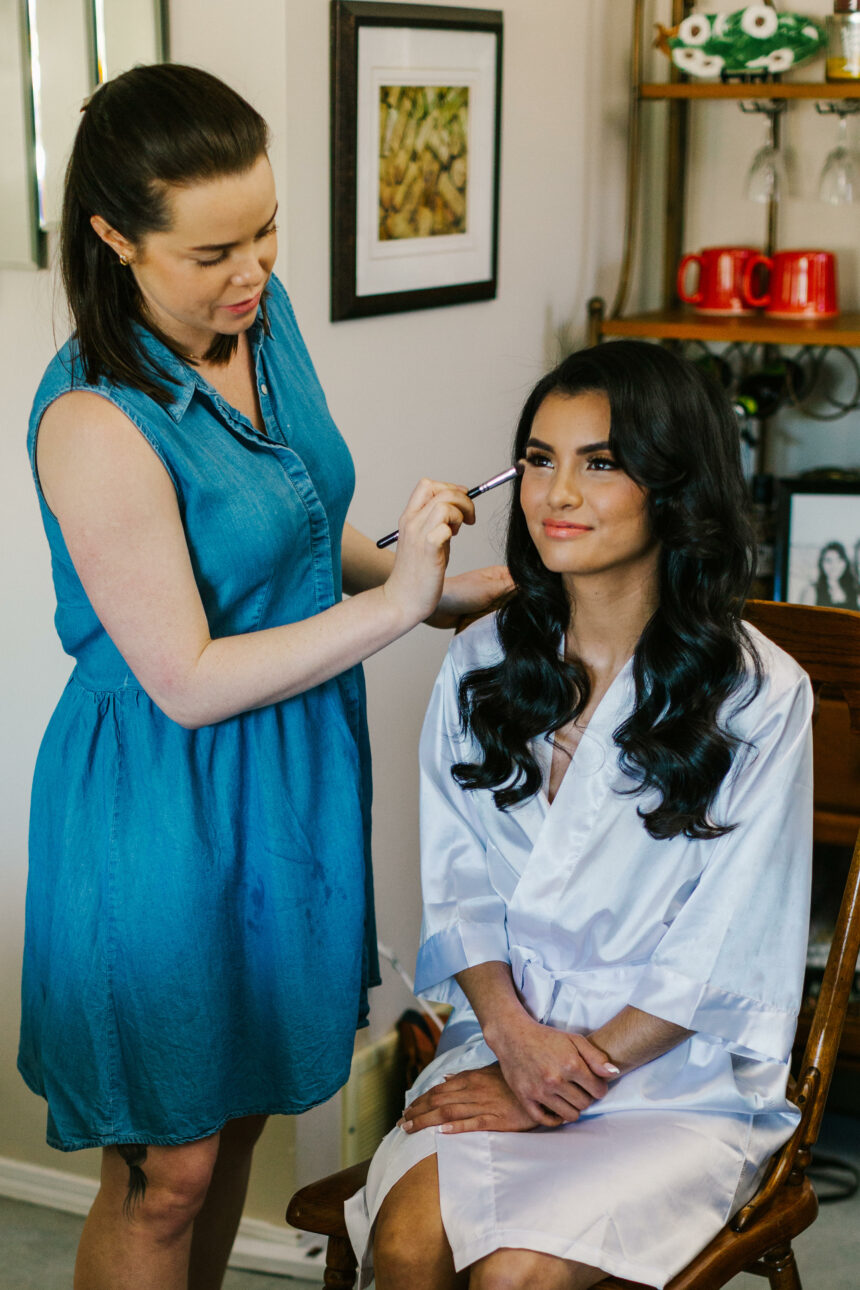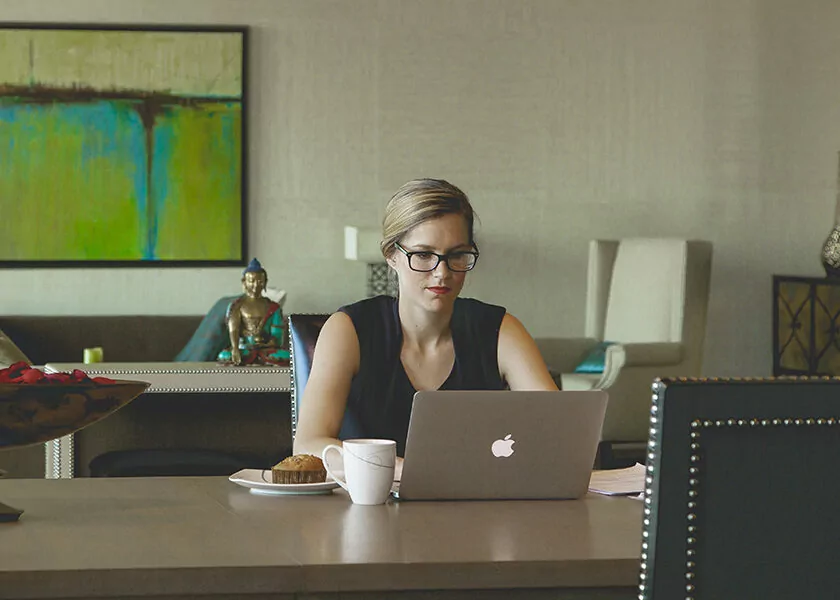Like most 18 year olds, England-dwelling Faye Smith didn’t know what career to choose.
“My friends were either enrolling in university—about to become a doctor or lawyer—or choosing a fun gap year in Australia,” Smith tells Thinkific. “But I had no idea what I wanted to do with my life.”
She knew one thing for sure: she wanted to learn, work, and travel. To figure out what she was good at, she enrolled in a few college courses—including theatrical makeup—on the side of her restaurant job. “I was testing a few different subjects to see what I liked,” she says. “I knew I was good at artistic subjects.”
She excelled in the course, so much so that her makeup teacher invited her to work on an opera set doing fake tattoos on people. Feeling inspired after this gig, she had the idea to work in the theater or movie industry as a makeup artist. “I knew I needed to learn more because this course was just a short course,” she explains. “I looked up makeup schools on the internet, and the first one to pop up was Blanche McDonald in Vancouver, BC—the other side of the planet. I decided to go.”
Once making the financial investment in makeup school, she was determined to make a career out of it. A few years later, she works full-time doing what she’s passionate about; she owns Faye Smith Agency—a hair and makeup agency—and Primp & Proper Salon, located in Gastown, Vancouver. In 2021, she opened a new branch of her agency, Faye Smith Academy: online courses via Thinkific. While she had a successful course launch, there were a few key things she wished she did differently:
Skip ahead:
- She wished she did more research
- She wished she’d created a strategic marketing plan
- She wished she’d focused on shorter, more affordable courses
Smith started her agency business slowly; while attending Blanche McDonald, she landed her first-ever freelance gig at a big wedding. She needed an extra person to assist her, so she hired one of her classmates to help her. “I kept getting more and more bigger bookings and needing more help,” she shares.
Her work developed into an agency in 2009; she organized the client’s bookings, hired artists, and it increasingly grew over the years. Since, she’s worked with celebrities and has expanded the agency into Toronto, with plans to potentially expand into Calgary as well. “It just keeps on growing,” she says.
In 2015, she won the best wedding hairstyle in the Professional BC Wedding Awards. “Winning this award was a shock,” she laughs. “I was more known for makeup at that time and didn’t consider myself to be the best hair stylist. But all of a sudden, I was given this award and I had all of this credibility.”
Since gaining this momentum, she decided to host an in-person workshop teaching makeup artists and hair stylists. “12 people enrolled, and it sold out,” she says.
She hosted more and more of these sold-out workshops. Then, she received a grant in 2021 and decided to turn her workshops into an online format. Thanks to the grant money, Smith was able to hire a videographer to help her to film the courses. “I was excited at the thought of reaching a worldwide audience,” she says. “With in-person classes, I could only reach locals.”
“I liked the idea that with online courses, you can record something that, yes, might take a while to record, but after that it becomes a product that you can continuously sell,” shares Smith.
When she launched her first course in 2021,16 people purchased it—producing around $2,500 in revenue. “It sold really well,” she says. “I think everyone was excited for this new course we produced, and we made our investment back right away.”
“I have a roster of over 100 artists, so I can directly target them,” she says. “Plus, I’m big in my industry.”
To make these 16 sales, she ran a 50% off promotion; she showed the original price and then showed the price she was selling it at so that her purchasers felt that they were getting good value. She priced it at $395.

When asked how she converted potential students into course purchasers, she said it was simple. “Honestly, I just posted about it and people purchased it. I was as simple as that.”
However, her subsequent courses (she now has a total of four) didn’t sell nearly as well. In hindsight, she says she would have done more research before starting an online course. “I don’t typically do a ton of research,” she admits. “But things are different now; with so many online products, putting out an online course is like putting a product in a store. You can’t just put a product in a store and think that people are going to buy it; you have to put effort into researching and devising a plan—and taking it seriously.”
After the first successful course launch, she created three more pre-recorded courses to sell on her website, totaling four. Her second was also created with the help of the videographer, priced at $195. The other two were created by herself and were priced at $39 since they were a shorter format and less cost-intensive to produce.
“The quality wasn’t as good without the videographer,” she admits. “It’s a fine line because the videography is too expensive, but you still need the videos to be good quality.”
Many people message her asking about when her next in-person class would be. When she didn’t have any planned, she would direct them towards her online, pre-recorded courses instead. However, converting potential students into course purchasers has been “like pulling teeth,” according to Smith. “I admit, the only type of marketing I’ve done is posting on Instagram as well as a couple of email campaigns,” she reveals.
She says that if she had more time, she’d release a free course or webinar to act as a lead magnet. However, as a new mother of a one-year-old, her hours are limited. “I know our marketing can be better—and marketing things online is very different from marketing something that you sell in-person.”
In terms of a marketing platform, she mostly uses Instagram, Facebook, and has begun experimenting with TikTok. “My course sales haven’t necessarily been as successful as I would like, but it’s also not the number one thing I’m focussing on, either.”
“I’ve noticed that people who are successful with online courses have it as their full-time gig,” she says. “I was hoping that online courses would be more of a side gig, but I realized that more effort has to go into it than just posting about my courses and hoping that people will buy them.”
She advises that online course creators create a marketing plan that lets them be competitive in their industry.
“You have to be aware of who and what you’re competing with,” she says. “Being successful online requires dedication, time, and commitment.”
Her audience consists of professional hair and makeup artists; while any gender is welcome, she says most of her online course students are women between the ages of 18 and 40, and most are from Canada, the US, and the UK.
Since her first, successful course launch, her audience has been asking for shorter, more affordable courses. In fact, Smith believes that this is where the future of online courses are heading in 2024 and beyond. “I’m definitely feeling like the world is a little concerned about money right now—and that people don’t really have it,” she says. “I think those more affordable courses might sell better over the next year or two.”
In the future, Smith would like to put more effort into her online courses. She says that she, too, will go down the route of offering short, affordable digital products. “That’s what seems to be asked for,” she says. “And I think you have to listen to what people are directly asking you for.”
Her number one advice for those wanting to break into the world of online education? Take the time to listen to your audience, plan out your process, and develop a strategy on how to get your course into the hands of those who need it most.
If you’re ready to try your hand at creating your own online course, the time is now. Sign up for Thinkific today—for free!






